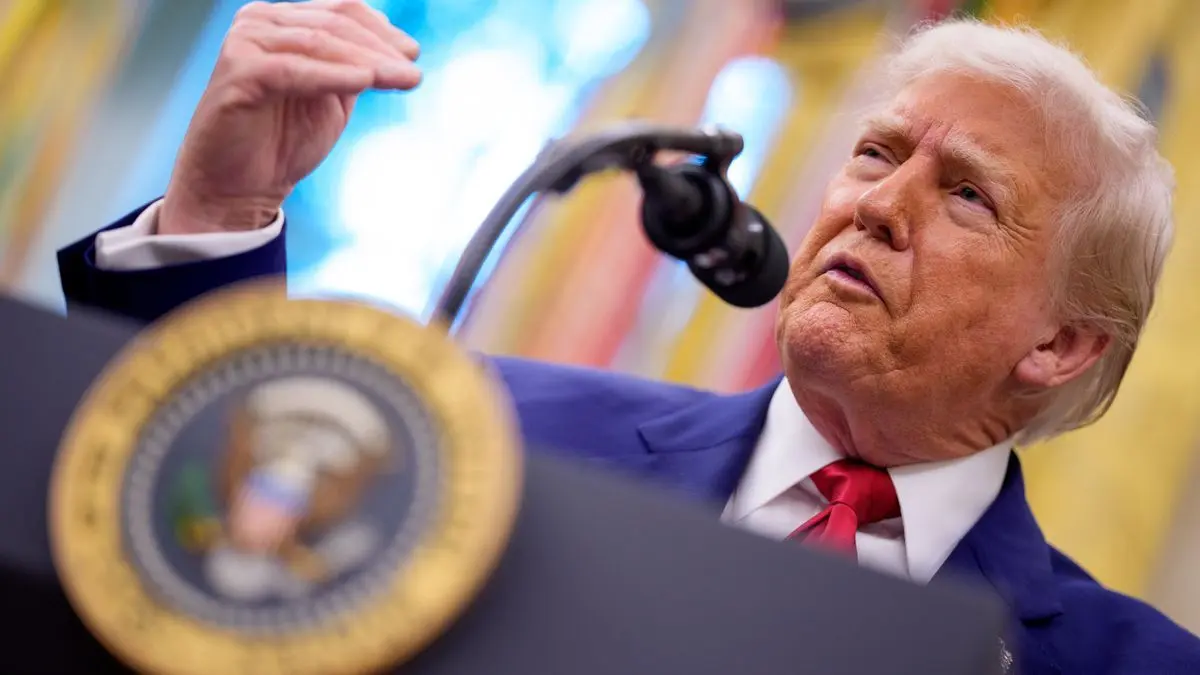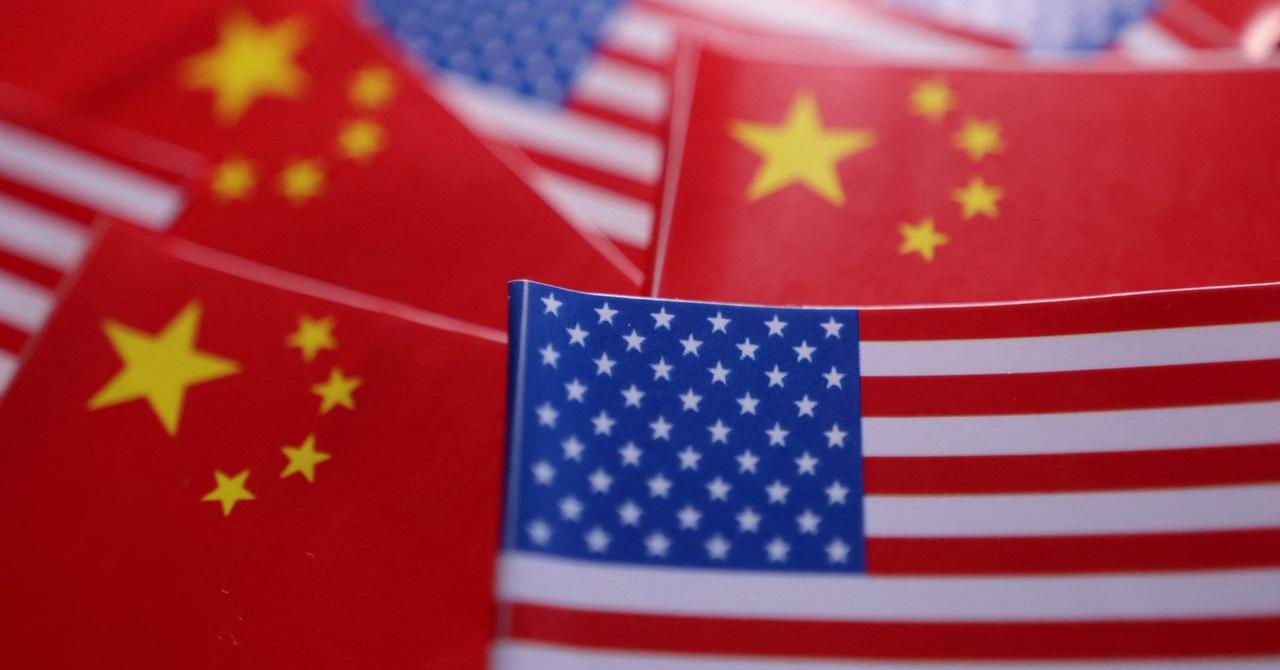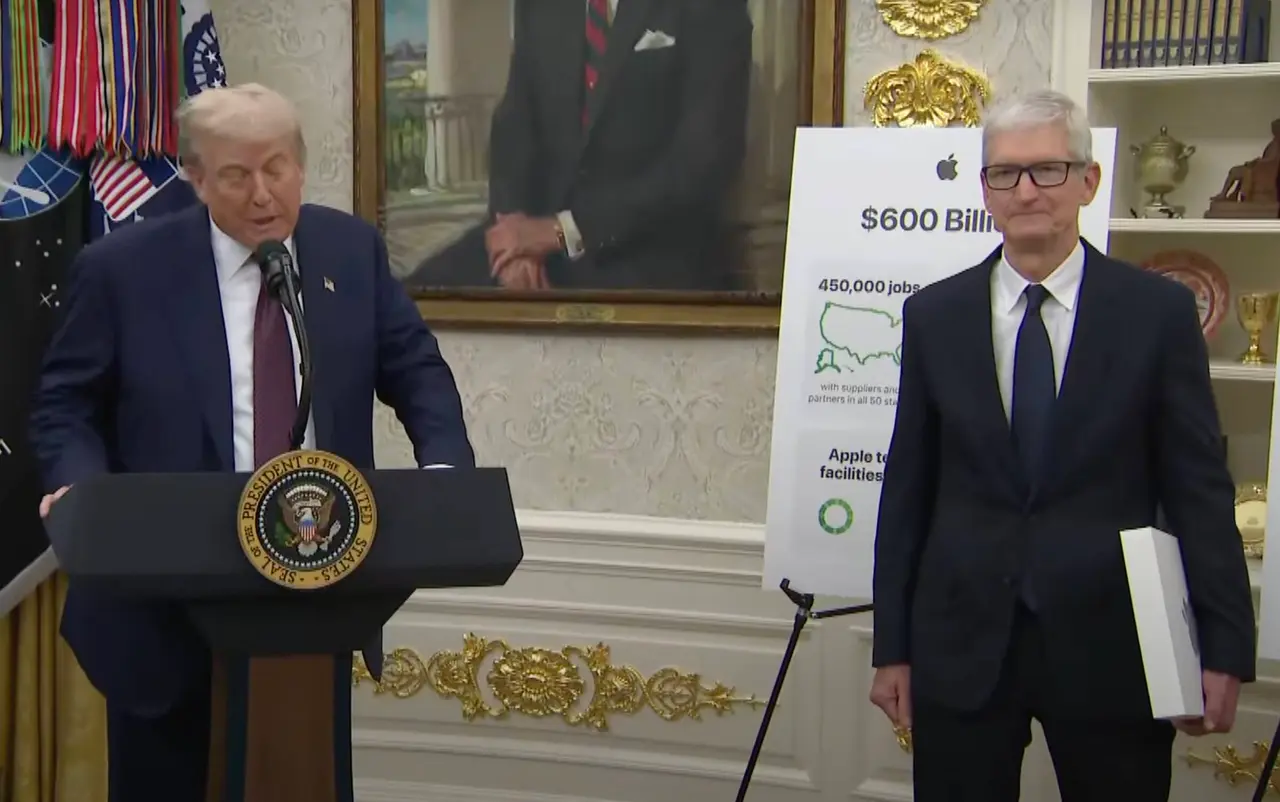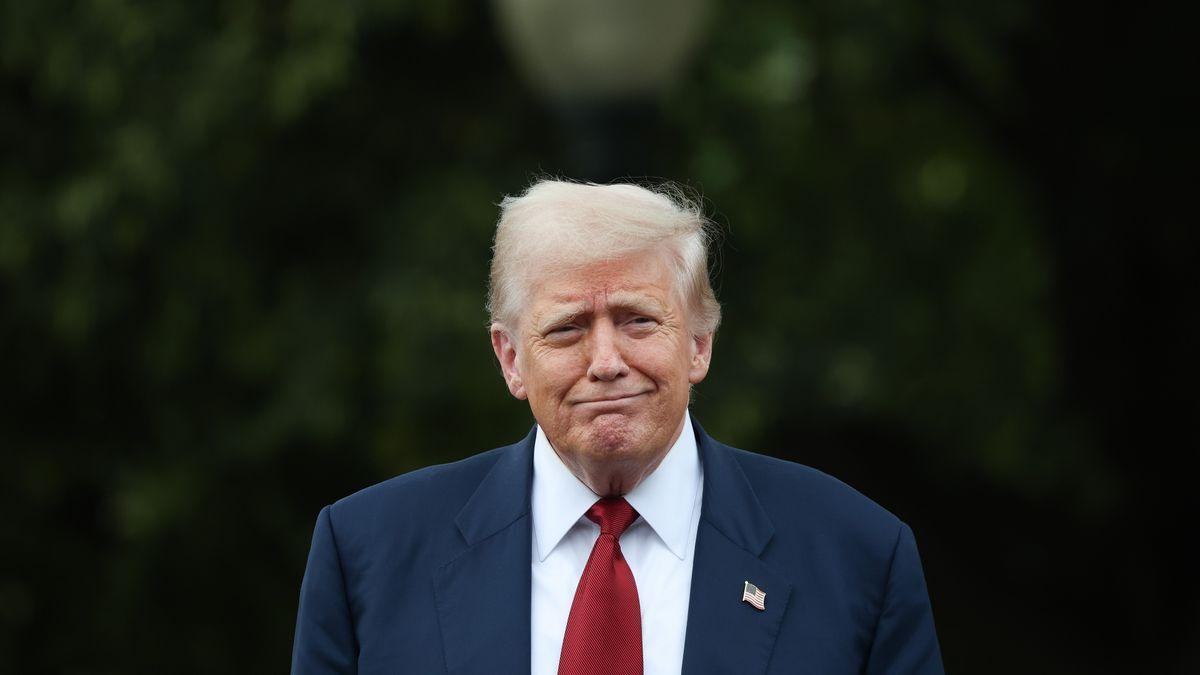Trump Shifts Focus to High-Tech and Military Manufacturing, Downplays Textile Industry
4 Sources
4 Sources
[1]
Trump: America is looking to build tanks and computers not socks and T-shirts
"I'm not looking to make T-shirts, to be honest. I'm not looking to make socks. We can do that very well in other locations," Trump told reporters before boarding Air Force One in New Jersey on May 25. "We are looking to do chips and computers and lots of other things, and tanks and ships." Trump added that he agreed with Treasury Secretary Scott Bessent that the U.S. does not need a "booming textile industry" - comments that were roundly criticized by domestic manufacturers and producers of fiber, yarn, home products, and more. "We're not looking to make sneakers and T-shirts. We want to make military equipment," he said. "We want to make big things. We want to make, do the AI thing." China has been the world's largest apparel manufacturer and exporter for more than a decade. In response to the Republican president's trade war with Beijing, several Chinese social media users have mocked the United States with AI-generated viral videos depicting bored, unskilled and disengaged Americans unsure of how to prepare a piece of fabric before placing it on a sewing machine. Others in the videos have glazed looks while assembling smartphones. Toward the end, the screen flashes, "Make America Great Again." The American Apparel & Footwear Association responded to Trump's remarks saying that additional tariffs would only further burden the industry. "With 97% of the clothes and shoes we wear being imported, and with clothes and shoes already the most highly tariffed industry in the U.S., we need to focus on common sense solutions that can move the needle," AAPA President Steve Lamar said in a statement. "More tariffs will only mean higher input costs for U.S. manufacturers and higher prices that will hurt lower income consumers." Trump on April 3 announced global "Liberation Day" reciprocal tariffs, sending the world's financial markets into a nosedive before pausing the tariffs for 90 days for most countries except China. Trump won the 2016 and 2024 U.S. presidential elections in part by appealing to working class voters hurt by the loss of U.S. manufacturing jobs over many years. The Trump administration has been negotiating trade deals with various countries since April. The only deal reached so far has been with the United Kingdom. Talks with China, which imposed tit-for-tat tariffs on the U.S., are ongoing after both countries agreed to lower steep tariffs. Contributing: Zac Anderson, USA TODAY; Reuters Swapna Venugopal Ramaswamy is a White House correspondent for USA TODAY. You can follow her on X @SwapnaVenugopal
[2]
Tanks, not T-Shirts: What Trump really wants from tariffs
President Trump clarified his tariff policy, emphasizing its focus on boosting domestic production of military and technology equipment rather than consumer goods. He stated the U.S. aims to produce military equipment, AI, computers, chips, tanks, and ships. Trump also reignited his aggressive trade stance by proposing tariffs on EU goods and iPhones.US President Donald Trump said on Sunday that his tariff policy is focused on bolstering domestic production of military and technology equipment, rather than consumer goods like sneakers and T-shirts. Speaking to reporters before boarding Air Force One in New Jersey, Trump echoed Treasury Secretary Scott Bessent's recent comments that the U.S. doesn't necessarily need a booming textile industry -- a stance that has drawn criticism from the National Council of Textile Organizations. "We're not looking to make sneakers and T-shirts," Trump said. "We want to make military equipment, big things, AI, computers, chips, tanks, and ships." Trump, who has roiled global markets with sweeping tariffs, reignited his aggressive trade stance on Friday by proposing a 50% duty on European Union goods from June 1, and floated a 25% tariff on all imported iPhones sold to U.S. consumers.
[3]
Trump Emphasizes Tariff Policy Aims To Boost Military Equipment And Tech Manufacturing Over Textiles: 'We Want To Make Big Things' - Apple (NASDAQ:AAPL)
President Donald Trump clarified that his tariff strategy aims to boost domestic production of military equipment and technology rather than textiles, as trade policy continues to reshape U.S. manufacturing priorities and market dynamics. What Happened: Speaking to reporters before boarding Air Force One in New Jersey on Sunday, Trump endorsed Treasury Secretary Scott Bessent's April 29 comments dismissing the need for a "booming textile industry," according to a Reuters report. "We're not looking to make sneakers and T-shirts. We want to make military equipment. We want to make big things. We want to make, do the AI thing," Trump stated. "I'm not looking to make T-shirts, to be honest. I'm not looking to make socks. We can do that very well in other locations. We are looking to do chips and computers and lots of other things, and tanks and ships." The American Apparel & Footwear Association pushed back, with President Steve Lamar noting that "97% of the clothes and shoes we wear being imported" making additional tariffs counterproductive for lower-income consumers. Trump earlier threatened Apple Inc. AAPL with "at least 25%" tariffs on iPhones unless manufacturing shifts from India to domestic facilities, causing AAPL shares to slide over 3% in premarket trading. See Also: 10-Year Yield Tops 4.55% Despite Trump's EU Tariff Delay As Bond Market Signals Fiscal Concerns Get StartedEarn 7.2% -- No Matter What the Fed Does Markets expect rate cuts -- but your earnings don't have to suffer. Lock in 7.2% until 2028 from ten individual bonds. Get Started Why It Matters: Trump's selective manufacturing focus reflects broader economic pressures. A Harvard Business School study published May 17 found tariffs imposed since "Liberation Day" increased prices on both imports and domestically-produced goods relying on foreign inputs. The Institute for Supply Management reported U.S. manufacturing contracted for two consecutive months through April, with price indices hitting three-year highs. Apparel prices are projected to jump as much as 64% in the short term once existing forward contracts expire, according to Yale's Budget Lab, signaling that the full impact of tariffs may hit consumers later this year. Read Also: Eric Schmidt Says He Often Meets People Who Can't Tell Apart The Real World From The Online One, Now The Ex-Google Boss Is Warning AI Will Only Make It Worse Disclaimer: This content was partially produced with the help of AI tools and was reviewed and published by Benzinga editors. Photo courtesy: Joey Sussman / Shutterstock.com AAPLApple Inc$195.85-2.74%Stock Score Locked: Edge Members Only Benzinga Rankings give you vital metrics on any stock - anytime. Unlock RankingsEdge RankingsMomentum46.18Growth33.12Quality76.88Value8.65Price TrendShortMediumLongOverviewMarket News and Data brought to you by Benzinga APIs
[4]
Trump says US wants to make tanks, not T-shirts
MORRISTOWN, New Jersey (Reuters) -U.S. President Donald Trump said on Sunday his tariff policy was aimed at promoting the domestic manufacturing of tanks and technology products, not sneakers and T-shirts. Speaking to reporters before boarding Air Force One in New Jersey, Trump said he agreed with comments from Treasury Secretary Scott Bessent on April 29 that the U.S. does not necessarily need a "booming textile industry" - comments that drew criticism from the National Council of Textile Organizations. "We're not looking to make sneakers and T-shirts. We want to make military equipment. We want to make big things. We want to do the AI thing with computers," Trump said. "I'm not looking to make T-shirts, to be honest. I'm not looking to make socks. We can do that very well in other locations. We are looking to do chips and computers and lots of other things, and tanks and ships," Trump said. Trump, who has upended world markets with the broad imposition of tariffs, revived his harsh trade rhetoric on Friday when he pushed for a 50% tariff on European Union goods starting June 1 and warned Apple he may impose a 25% levy on all imported iPhones bought by U.S. consumers. (Reporting by Jeff Mason in Morristown, New Jersey; Writing by Daniel Trotta; Editing by Nia Williams)
Share
Share
Copy Link
President Trump emphasizes the importance of producing advanced technology and military equipment over textiles, sparking debate on US manufacturing priorities and trade policies.
Trump's Manufacturing Vision: Tanks and AI Over T-shirts
President Donald Trump has articulated a clear shift in his administration's manufacturing priorities, emphasizing the production of advanced technology and military equipment over consumer goods like textiles. In a statement to reporters before boarding Air Force One in New Jersey, Trump declared, "We're not looking to make sneakers and T-shirts. We want to make military equipment. We want to make big things. We want to make, do the AI thing"
1
2
.
Source: Market Screener
Focus on High-Tech and Military Production
Trump's comments align with those of Treasury Secretary Scott Bessent, who previously stated that the U.S. does not necessarily need a "booming textile industry"
1
. The President elaborated on this stance, saying, "I'm not looking to make T-shirts, to be honest. I'm not looking to make socks. We can do that very well in other locations. We are looking to do chips and computers and lots of other things, and tanks and ships"3
.This shift in focus reflects the administration's desire to bolster domestic production in sectors deemed critical for national security and technological advancement. Trump specifically mentioned artificial intelligence, computers, chips, and military equipment as areas of priority
2
4
.Trade Policy and Tariffs
The President's manufacturing vision is closely tied to his aggressive trade policies. Trump recently proposed a 50% tariff on European Union goods starting June 1 and suggested a potential 25% levy on imported iPhones sold to U.S. consumers
2
4
. These moves have sent ripples through global markets and reignited debates about the effectiveness of tariffs in reshaping domestic manufacturing.Related Stories
Industry Reactions and Concerns
The American Apparel & Footwear Association has expressed concerns about the potential impact of additional tariffs on the industry and consumers. Steve Lamar, the association's president, stated, "With 97% of the clothes and shoes we wear being imported, and with clothes and shoes already the most highly tariffed industry in the U.S., we need to focus on common sense solutions that can move the needle"
1
.A Harvard Business School study found that tariffs imposed since "Liberation Day" have increased prices on both imports and domestically-produced goods relying on foreign inputs
3
. The Institute for Supply Management reported that U.S. manufacturing contracted for two consecutive months through April, with price indices hitting three-year highs3
.Global Context and Challenges

Source: USA Today
China, the world's largest apparel manufacturer and exporter for over a decade, has responded to Trump's trade war with mockery. Chinese social media users have created AI-generated viral videos depicting Americans as unskilled and disengaged in manufacturing processes, ending with the slogan "Make America Great Again"
1
.The shift in manufacturing focus also comes with potential challenges. Apparel prices are projected to increase significantly in the short term once existing forward contracts expire, according to Yale's Budget Lab
3
. This suggests that the full impact of tariffs may hit consumers later this year, potentially affecting lower-income households disproportionately.As the Trump administration continues to negotiate trade deals with various countries, the only agreement reached so far has been with the United Kingdom. Talks with China are ongoing, with both countries agreeing to lower steep tariffs
1
. The ultimate impact of these policy shifts on U.S. manufacturing, consumer prices, and global trade relations remains to be seen.References
Summarized by
Navi
[4]
Related Stories
Trump's Proposed 100% Tariff on Foreign-Made Semiconductors: Implications and Uncertainties
07 Aug 2025•Business and Economy

China Deploys AI-Generated Videos to Mock US Tariffs and Manufacturing Revival Plans
05 Apr 2025•Technology

Apple Pledges $100 Billion for US Manufacturing, Balancing AI Investments and Political Pressure
07 Aug 2025•Business and Economy

Recent Highlights
1
ByteDance's Seedance 2.0 AI video generator triggers copyright infringement battle with Hollywood
Policy and Regulation

2
Demis Hassabis predicts AGI in 5-8 years, sees new golden era transforming medicine and science
Technology

3
Nvidia and Meta forge massive chip deal as computing power demands reshape AI infrastructure
Technology





